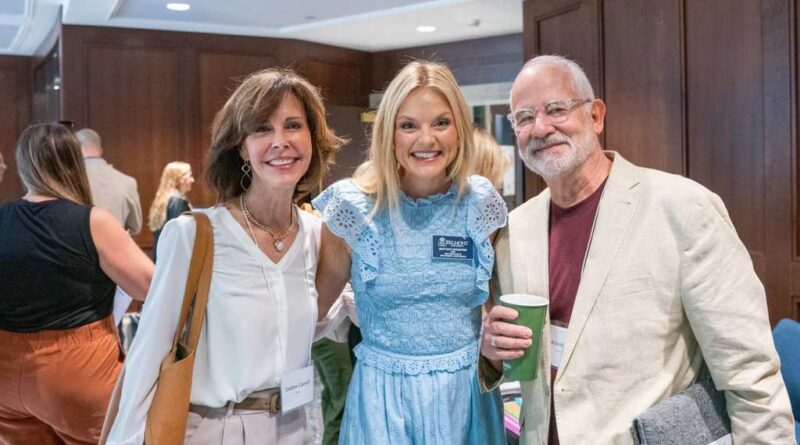Belmont Summit Addresses Unique Mental Health Issues on Nashville Music Line
Music industry professionals are not, by definition, first responders, but they do have the ability to save lives.
That fact in itself may be a source of inspiration for many music-related workers who have their own form of burnout, discouragement or depression.
Reminding music professionals of the impact of their product is one of the highlights of the 24/7: Mental Health in Entertainment Conference, presented Aug. 7 is Belmont University in Nashville.
I’ll have people in the industry come up to me and say, ‘No, it’s not like we’re doing brain surgery. I know our place in the music industry is not that important,’ ” President of Entertainment Health Services Elizabeth Porter what he said during the seminar “Work/Life Balance”. “I say it’s more important… I say there are two big influences in the world: the entertainment industry and politics.”
Politics often creates divisions. Music, at best, can bring a group together – or, at least, an individual. Founder of Porter’s Line Al Andrews he recalled a “very dark and suicidal time” decades ago when he found out Jennifer Warnes‘Bernadette’s song,’ and she played it over and over, relishing its healing message as she transformed herself. During his career as a therapist, Andrews has come across many stories about songs that have kept his patients coming back.
“We all have times when we are saved, times when we were drowning and someone threw us a rope and pulled us in,” he said during the last session of the day. “Mostly music is involved. Hope goes with a soundtrack. It’s almost always like that.”
The power of music is what draws many people to work in the industry. But the experience of working every day emotionally – especially when companies are understaffed and the work seems non-stop – makes music workers vulnerable to burnout and depression emotionally. The allure of a vocation associated with fame and entertainment reinforces the point.
“We have a very unique industry because I think it’s the only one that is closely related to our identity,” the C3 Presents festival director. Brad Parker that said. “The epidemic has shown that to many of us. I felt like a part of me was being taken away whenever live music ended during this pandemic, and I wanted a lot of air to make sure people enjoyed Brad Parker outside. identity of ‘I’m a Bonnaroo guy.’ “
Parker recalled how determined he was, for the first five to seven years of his career, to make work-related calls after hours, fearing that if he didn’t , others were lining up to replace him. It’s that kind of fear that keeps many industrial worker bees at work late into the evening.
“The industry is 24/7,” Shading the Limelight founder Christy Williams said, “hence the title of this meeting.”
Williams, in the opening speech of the event, explored the opinions of celebrities, whose opinions and behavior influence their employees and the clarity from the entire industry. Fame, he said, is accompanied by two driving forces: a sense of inadequacy that creates self-embarrassment and a competitive sense of entitlement that leads to unrealistic expectations. Celebrity sightings ride a pendulum, Williams said, going back and forth between those points. If that phenomenon is not controlled, the pendulum can become a wrecking ball.
“Success is much harder to control than failure,” he said, “and the more the pendulum swings, the more it tends to destroy us.”
That pendulum – and others – are inevitable. Mental health, Williams maintained, comes from managing change and emotions in it.
Recognizing the industry’s weaknesses, the director of Belmont’s Curb College of Entertainment & Music Business. Brittany Schaffer announced plans to create a Center for Mental Health in Entertainment. He cited four leaders for the steering committee — Andrews, Onsite Workshops vp of entertainment and special services Debbie CarrollMusic doctor A&R manager Rachel Wein and founder/CEO of the Music Health Alliance Tatum Hauck Allsep – is charged with creating the show, which will eventually be housed in Belmont’s Music Row building, which is slated to open in 2028.
Schaffer said: “Until then, we will work to build a team that will support this center so that it can be there long before the building is there.”
Warner Music Nashville co-head/co-CEO Chris Lacy described four factors that undermine the emotional well-being of artists and the industry around them: the tendency to compare their work to their peers, negative criticism from social media, managers who prioritize self-promotion pass their support role and “good form.” of scarcity” which, perhaps, leads to fear and depression.
One obvious solution for artists and business in general is based on an industrial product. Andrews suggested that there is a “great purpose” in music, and everyone in the business contributes to its influence.
“If you’re in the industry, each of you is a part of producing songs,” he said. “Everyone in this room has a song that saved their life, and it is part of the songs that enter people’s hearts. Some of those people, like you and me, are going through a rough patch or not in a good place, or maybe they’re fighting a big battle, and you’re gone. [hope]. I want you to believe that. I want you to accept that. Be inspired today by what you do. ”
Subscribe to Billboard Country News, the industry’s must-have source for news, charts, analysis and features. Sign up for free delivery every weekend.
#Belmont #Summit #Addresses #Unique #Mental #Health #Issues #Nashville #Music #Line
